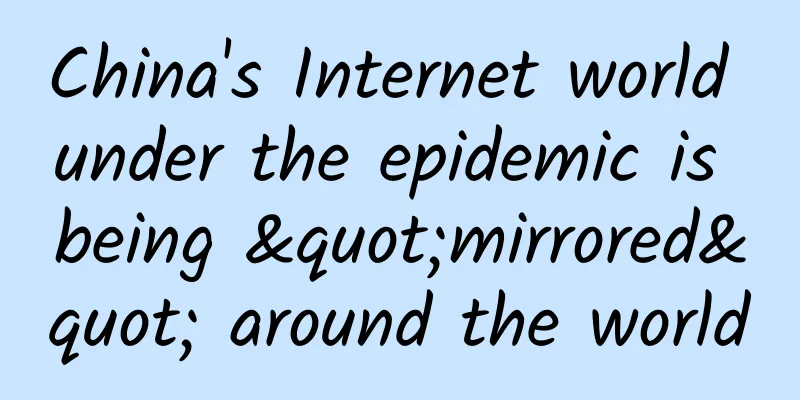China's Internet world under the epidemic is being "mirrored" around the world

|
DingTalk made its debut in Japan. "Well... the Japanese version of the work-from-home guide is being developed..." DingTalk's official Weibo account posted a tweet on February 29, indicating that the Japanese version of Dingtalk is on the way. "Although the mountains and rivers are different, the moon and the sky are the same. The Japanese version of the guide to working from home is here!" On March 1, DingTalk officially released the Japanese version of the guide to working from home, hoping to contribute to the normal operation of major Japanese companies, schools and other institutions during the epidemic. In recent days, the epidemic has begun to spread in Japan, and many government departments have begun to implement remote work. Primary and secondary schools across the country have temporarily suspended classes. Tokyo Disneyland and Osaka Universal Studios have both announced closures, most offline performances have been cancelled, and movies have been withdrawn. Whether the imminent Olympic Games can be held as scheduled has also been listed as a wait-and-see matter. In addition to Japan, outbreaks have occurred in South Korea, Italy, Iran, the United States and other places, and confirmed cases have been found in 74 countries on six continents. As of 0:00 on March 6, Beijing time, the number of confirmed cases of new coronary pneumonia outside China has reached 15,886, and the number of newly confirmed cases outside China in the past day is 15 times that of China. As the epidemic continues to escalate around the world, the world economy is facing severe challenges. The film and television entertainment industry is facing a more severe winter, offline consumption and tourism are beginning to "survive the catastrophe", remote work and online education are ushering in opportunities, and live broadcast and short video products are "cross-border support"... Everything that happened on the Chinese Internet more than a month ago began to happen again on the world Internet. From Milan to Berlin to London, as the epidemic spread, all walks of life began to work online; the U.S. Centers for Disease Control and Prevention also issued a notice to companies across the country, requiring companies to implement employees working from home as soon as possible; India's financial research platform Sentieo has monitored 77 large companies switching to remote work in the past month alone, while only four companies adopted this working model in the same period last year. As remote work is being implemented on a large scale around the world, China's Internet giants have smelled this good opportunity to go overseas. Collaborative office software represented by DingTalk, Feishu, and WeChat for Enterprise has been through many trials and tribulations in the past month, overcoming various bugs caused by 200 million people working online at the same time, and has achieved explosive growth in a short period of time. Knowing that other countries have also started remote work, the products "trained" by the whole people have gone abroad. From DingTalk official Weibo "Although the mountains and rivers are different, the moon and the sky are the same. The Japanese version of the guide to working from home is here!" On March 1, DingTalk officially released the Japanese version of the guide to working from home, hoping to contribute to the normal operation of major Japanese companies, schools and other institutions during the epidemic. It seems to be DingTalk’s destiny to have “debuted” in the remote office industry but “break out” in online education. As the epidemic in Japan continues to escalate, public elementary and middle schools across the country have been suspended since March 2, and the date of re-opening is nowhere in sight. Many schools have also switched to online classes. COSMO Academy, a language school in Tokyo, has begun using DingTalk for remote teaching. The school's teachers and students said they would give DingTalk a four-star rating. However, most Japanese primary and secondary school students are not so "kind". History repeats itself and the DingTalk one-star campaign has begun in Japan. Words such as "perverted", "Sun Wukong's golden hoop", and "a headache" are common in the product review section of the Japanese version of DingTalk. Currently, DingTalk's overall rating in the Japanese app store is only 2.6.
Image source: Weibo “I suddenly could understand Japanese.” “Dingding, please release a Japanese version of the apology video.” "Young people in China and Japan have finally united in their hatred of the enemy. Let's complain about DingTalk together. Although we may be in different places, we share the same feelings and dreams!" Regarding what happened to DingTalk in Japan, there were many Weibo users who proudly praised the strong overseas capabilities of domestic apps while gloating over the misfortune. Following China and Japan, the suspension of classes for primary and secondary school students has become a global phenomenon: South Korea has repeatedly postponed the start of the spring semester; many private schools in Europe and the United States have also switched to home-based self-study or remote video classes in order to protect the safety of students; all schools in Iran have announced suspension of classes. Will DingTalk's one-star campaign also be globalized? Will the apology video be available in multiple languages? It is too early to talk about the international impact of remote office products going overseas. Although DingTalk and Feishu have already set sail for their overseas expansion, international Internet giants have already made plans in this field. Remote work is not new to Internet companies in Silicon Valley, and has even been practiced for decades in many companies. All well-known Internet giants, such as Apple, Google, Facebook, Twitter, etc., allow programmers to choose a comfortable and quiet office environment to improve work efficiency. A technician at Facebook headquarters once told Ciweigongshe that as long as they can get their work done, Facebook employees can work remotely every Wednesday. They can also work from home if they say hello to their boss. This is the norm for many Internet companies. According to data from Global Workplace Analytics, the number of people working remotely in the United States exceeds 30 million, accounting for 16% to 19% of its working population. Against this backdrop, a number of American remote office products, such as Zoom, Facebook Workplace, Microsoft Teams, and Slack, have become increasingly mature after long-term practice and technological iteration. As the epidemic continues to globalize, remote office products are also moving from being "China's hot spot" to "the world's hot spot." On February 27, an analyst at Bernstein revealed that the number of new users added by Zoom in the past two months this year has exceeded the number added in the whole of 2019. The number of downloads in China has increased significantly since the beginning of February, and Zoom's stock has risen by about 15%. Since the end of February, with the surge in the number of remote workers around the world, Zoom's downloads and active users have continued to grow. Compared with the United States, the penetration rate of remote work in other countries in the world is much lower. In Japan, Italy, Germany, the United Kingdom, France and other places, the penetration rate of online work is less than 10%. The temporary demand during the epidemic has provided excellent conditions for opening up new markets for remote work products. It may not be realistic to go to the United States and confront the giants head-on, but markets such as Southeast Asia, Japan, South Korea, the Middle East and Europe are worth a try. Although Japan DingTalk's one-star campaign is ridiculous, it indirectly shows the powerful functions and wide application scenarios of the product itself. There is hope for China’s remote office products to go overseas. Hollywood is panicking, and the world is entering a cold winter for film and televisionUnlike the popular remote work and online education, the epidemic has prolonged the winter of the film, television and entertainment industry. With films withdrawn, theaters closed, and crews stopped filming, the domestic film market is about to spend the first quarter of 2020 in a bleak manner. After the outbreak of the epidemic, the national box office revenue was zero. According to statistics from Dengta, in the past five years, the box office revenue in January and February accounted for more than 1/5 of the annual revenue. In the first two months of 2019, the total national box office revenue exceeded 13.7 billion yuan. This means that China's movie box office has lost tens of billions in more than two months. The share prices of companies such as Jinyi Film, Wanda Film, and Hengdian Film have all fallen by nearly 25%, and the market value of 17 leading A-share listed film and television companies has evaporated by about 30 billion. Today, the global economy is interconnected, and the butterfly effect is becoming more and more pronounced. The shutdown of China's film, television and entertainment industry has directly shaken the North American film market across the ocean. Hollywood movies such as "Jojo Rabbit", "Little Women", "Sonic the Hedgehog", "1917" and "Marriage Story", which had been scheduled for release in the mainland, were withdrawn along with other works as theaters closed. From the perspective of film themes, the art film "Little Women", the light comedy "Jojo Rabbit", and the serious film "1917" do not have a wide audience and are less affected by the withdrawal of films due to the epidemic. In addition, the films have Oscars to their credit, so their reputation and subsequent long-tail effects are still worth looking forward to. The movie "Sonic the Hedgehog" adapted from the game may suffer heavy losses. According to past experience, Hollywood-produced movie adaptations of games are quite popular in China. In 2016, "Warcraft" and "Full Thriller: Final Chapter" achieved box office results of 218 million US dollars and 160 million US dollars respectively, which are much higher than the revenue in the United States. As for the film "Mulan" tailor-made for the Chinese market, the original release date in the mainland was March 27. Due to the epidemic, Disney China has not yet announced the release date. Gong Li, who starred in the film, revealed in an interview with foreign media that "Mulan" is Disney's largest live-action fairy tale adaptation film so far, with a production cost of up to 300 million US dollars. The film is also given high hopes of hitting the 1 billion box office. Such a high-profile work is facing an uncertain future. Hollywood is panicking. Within a week, the stocks of many North American film companies fell, including Disney's 4.3% drop, IMAX's 2.6% drop, and Comcast's 2.6% drop. As the overseas epidemic spreads, the global film and television industry is facing the same crisis. Recently, Italy has closed 850 cinemas, accounting for 45% of the country's total cinemas, and most of the closed cinemas are concentrated in the regions with the highest box office output in Italy. At the same time, the filming plan of "Mission Impossible 7" starring Tom Cruise in Venice was stopped, and the resumption time is unknown. South Korea, another hard-hit area, has also entered a national epidemic prevention state. The 56th Daejong Film Festival, originally scheduled for February 25, was postponed; many films were withdrawn from the schedule in South Korea, including the black-and-white version of "Parasite", "Call" starring Park Shin-hye and Jeon Jong-seo, Pixar's new film "Onward", as well as "Hunting Time" and "Innocence"; TV dramas and movies being filmed in South Korea were also affected, such as "Assassination" starring Ryu Jun-yeol and Kim Tae-ri, and "Negotiation" starring Hyun Bin and Hwang Jung-min, which all changed their shooting schedules. In addition to the film industry, the Chinese variety show market under the epidemic is also mirrored in South Korea. Since most variety shows are produced in a "recorded and broadcast" format, the sudden outbreak disrupted the filming plans of many variety shows, and the programs currently being broadcast had to be suspended. In response, Korean TV stations adopted a "no-audience recording mode". In the music show "M! Countdown" broadcast on the evening of February 27, BTS promoted its new work "Black Swan" through a "cloud music promotion" method. There were no audiences and fans gathering on the scene, which reduced the safety risks to a certain extent, but the close contact between staff and artists still made many netizens worried. Chinese variety shows have created a safer way of recording: allowing artists to produce "cloud variety shows" through live broadcasts or vlog shooting. In early February, some variety shows in China began to implement "cloud recording". Contestants in "The Singer: The Year of Fighting" sang online in Beijing, Shanghai, Tokyo, Taipei, Changsha and other places, which greatly ensured the personal safety of artists and staff during the epidemic. Hunan Satellite TV's two ace programs "Happy Camp" and "Day Day Up" also transformed into cloud variety shows "Hey! What Are You Doing" and "Everyday Cloud Time" respectively; even online video platforms such as iQiyi, Youku and Tencent Video have launched their own cloud variety shows. In the same world, we all stay at home together. In the stay-at-home economy, the drama industry has become the only "winner" in the field of film, television and entertainment. In China, the effective broadcast volume of online dramas during the epidemic increased by 11.7%. Overseas, although the stock price of streaming platform Netflix has declined due to the overall environment, its S&P500 stock index has risen by about 13%. Many international consulting firms claim that Netflix will gain huge benefits from the epidemic. Some are happy while others are sad. When the epidemic is over, will the Chinese and even global film markets usher in "revenge consumption"? Can the losses in the first quarter of 2020 be "made up" in the remaining time? Will the industry order really return to normal after resuming work? You can’t find the answers to your questions in the cold winter, the only thing you can do is wait for spring. What can live streaming and short videos do for the global epidemic?Along with the epidemic, rumors are also spreading. The stories of "Three people make a tiger" and "The Wolf is Coming" not only happened on Chinese social media platforms, but also on international social media such as Facebook, Twitter, and Youtube, which were full of fake news related to the new coronavirus. In the early stage of the new coronavirus outbreak, other countries outside the country had not yet found a large number of confirmed cases, but as the epidemic in Wuhan continued to worsen, panic about the virus spread around the world through social media. Due to limited access to information about COVID-19 and the lack of knowledge about the novel virus among people in other countries, social media platforms have become the only way for overseas netizens to communicate with each other and ease panic. Rumor makers have taken this opportunity to spread false information, guide public opinion, and promote Sinophobia and discrimination against Chinese people on international social media platforms. Chinese communities around the world are experiencing similar things. From Los Angeles in the United States to Tokyo in Japan, and then to Paris and London, bullying incidents against Chinese communities are frequent, ranging from being pointed at on the subway and being scolded on the street to Chinese restaurants closing down and Chinese people being beaten in public. Racial discrimination is happening one after another. Some overseas netizens even maliciously published conspiracy theories that the new coronavirus is a "biological war launched by China against the world." The University of California, Berkeley, which has always been known as a century-old institution, also lost the objectivity and fairness that a higher education institution should have in a social media statement. On January 31, the outbreak gradually became known to the international community. The official health service blog of the University of California, Berkeley, sent a push on Twitter. The original intention was to appease the panic of teachers and students, but the tweet called Sinophobia a "normal reaction." Image source: Twitter Even during the epidemic, educational institutions are like this, which shows the number of rumors and the chaotic public opinion environment in international social media. As platforms, Facebook, Twitter, Youtube, etc. said in interviews with foreign media that they are doing their best to push authoritative and formal epidemic information, and reduce the spread of fake news by reducing the display weight. Currently, Twitter has connected the COVID-19 search on the site with the National Center for Disease Control and Prevention to ensure that the first few pieces of information retrieved by the public are authentic and valid. Searching for coronavirus on Twitter will directly link you to the Centers for Disease Control and Prevention TikTok (the international version of Douyin) also participated in this international social media "anti-counterfeiting campaign". In the early days of the epidemic, a large number of "pretending to be infected with the virus" short videos appeared on the platform. A teenager claimed in his short video that his friend was the first confirmed case of COVID-19 in Canada, but relevant departments found that this was just a prank under the guise of the epidemic. A short video pretending to be infected with the virus has been removed from TikTok On February 28, WHO (World Health Organization) opened an official TikTok account and personally filmed a short video to dispel rumors. "We joined Tiktok to provide the public with more timely and reliable epidemic prevention and control advice." In the first short video released by WHO on Tiktok, the public was informed of the correct epidemic prevention measures. In addition to fulfilling social public functions, China's short video platforms and live broadcast platforms have linked multiple fields through content, and the Internet has once again successfully "revitalized" traditional industries. The first industry to break through through short videos and live streaming was the global tourism industry. The international tourism industry has become lifeless since the absence of Chinese tourists. The Sapporo Snow Festival in Japan, which is crowded every year, only had a few tourists wearing masks this year; many small and medium-sized travel agencies in the United States are facing bankruptcy due to lack of customers; duty-free shops and luxury shopping malls in various countries have also become deserted. Without China's "moneybag", the global consumer economy began to decline. While Chinese tourists are unable to "go out", major scenic spots and historical sites around the world are being "brought in" through the Internet. At 8pm Beijing time on February 15, a unique "online museum tour" was staged on Kuaishou Live. More than 2 million Kuaishou users, led by the gold medal commentator Chang Ji, traveled to the British Museum in London from home. Although it is a product of modern technology, live broadcast technology allows viewers to travel through time and space and feel the long-standing world civilization as if they were there. With the first successful cross-border cooperation, Kuaishou Live once again led online audiences into the UCCA Center for Contemporary Art on February 29, where nine musicians including Ryuichi Sakamoto interacted with the audience in real time. Ryuichi Sakamoto even performed with a cymbal made in Wuhan in the cloud concert, and the sincerity and warmth conveyed in the music were moving. Before the end of his performance, this world-renowned musician gently said in Chinese to the screen, "Come on, everyone!" In just over two months, we have witnessed the panic, trauma, grief, difficulties and opportunities that the epidemic has brought to a country. And all of this is happening again in other parts of the world, like a reincarnation. Although the global epidemic is still escalating, those of us who have "experienced" it in advance know that hope lies ahead. |
>>: 2020 IT Salary Survey: What are the higher-paying positions?
Recommend
Aruba Launches New EdgeConnect Microbranch Solution to Power a Modern Hybrid Workplace Experience
Aruba, a Hewlett Packard Enterprise company (NYSE...
In the digital age, FONE comprehensive budgeting practice sharing in the pharmaceutical industry
In recent years, the pharmaceutical industry has ...
FreeWheel Diane Yu: Gather the best people to do the happiest things
[51CTO.com original article] This is not the firs...
Ruijie Networks releases its wireless product strategy of “Vast New Connections”
On June 5, Ruijie Networks held a "Vast New ...
5G is here, will the true Internet of Everything start with the eSIM card?
[[264407]] After experiencing SIM card cutting, m...
How to use logview to diagnose slow jobs in MaxCompute
Here we divide the problems of slow task running ...
Morphling: How to maximize cost reduction when deploying AI in cloud native?
With the vigorous development of cloud-native tec...
Weibu Online was shortlisted for CDM 2021 Black Unicorn Awards
On August 3, 2021, CyberDefense Magazine, a world...
Hosteons: New 1Gbps bandwidth KVM host starting at $21/year, AMD Ryzen CPU+NVMe high-performance host starting at $24/year
In December last year, we shared the news that Ho...
Using data to speak, Hubo Technology helps improve college students' critical thinking and research capabilities
Recently, in order to enrich product functions an...
The real year of 5G: What it means for cloud technology
We are now in the third year of “The Year of 5G.”...
5G empowers thousands of industries and builds a new blueprint for future energy
The importance of energy to national development ...
Cloud computing has dominated network infrastructure for many years, and it’s time for the 5G era to usher in the next chapter!
[[262785]] Technavio predicts that the applicatio...
Sending Messages - RocketMQ Knowledge System (II)
[[410032]] In the previous article, we got to kno...





![[Black Friday] Tudcloud: Hong Kong VPS annual payment up to 40% off, recharge 30%](/upload/images/67cac01d70dec.webp)



